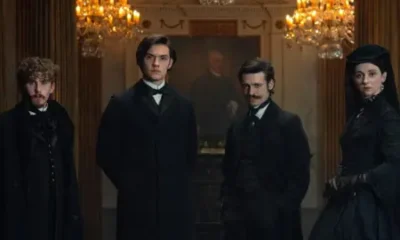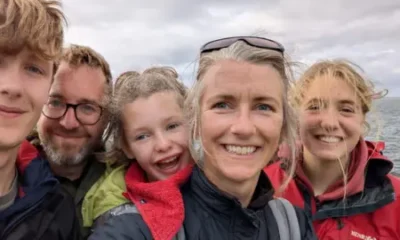Breaking News
Govt warned of ‘damaging’ economic effect of Budget spend

Read more on post.
The Government has been warned of the danger of overheating the economy with its planned €9.4 billion spending increase in the Budget next month by the Economic and Social Research Institute.
The development comes a week after the Central Bank said the additional expenditure in the Budget was “too large”.
The ESRI said the Government’s extra spending could have “damaging” effects on the economy.
It also warned windfall taxes paid by multinationals could “vanish quickly” and “parallels to the collapse in building-related taxes at the outset of the economic crisis of 2007–2008 are clear”.
The ESRI also questioned the Government’s position of financially assisting companies to seek new markets abroad while opposing the EU-Mercosur deal which would see more trade with South America.
The ESRI’s Research Professor Alan Barrett said the Government’s position “seems somewhat extraordinary”.
The Mercosur deal has been vigorously opposed by the farming groups concerned about the impact of South American beef imports.
The ESRI has revised upwards its forecast for growth for this year to 3.9% for the domestic economy.
It said 35,000 homes will be built this year but added it expected the increase in house building next year and in following years will be slower than expected.
It said future construction of homes “appears to be weakening with falling planning permissions and low commencements”.
It said the EU’s tariff agreement with the Trump administration had brought certainty to trade but said 15% tariffs were a “a clear deterioration in Ireland’s trading environment”.
An analysis by Professor John Fitzgerald in the ESRI’s quarterly economic commentary showed the US tariffs will impact profits of pharmaceutical companies operating in Ireland, rather than output or employment.
On the cost-of-living the ESRI said price rises for food were hitting middle- and lower-income households.
Breaking News
It’s got Peaky Blinders swagger, says House of Guinness writer

Read more on post.
Yasmin RufoBBC News
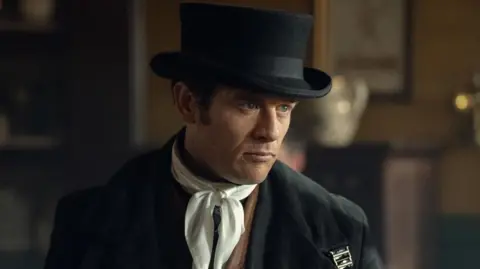 Netflix
NetflixTaking family power struggles and turning them into global television sensations is becoming something of a habit for screenwriter Steven Knight.
With Peaky Blinders, he took a Birmingham street gang and made them a cultural force. Now, Knight is betting on another dynasty, one rooted in brewing, wealth and legacy.
House of Guinness, which launches on Netflix on Thursday, tells the story of Ireland’s most famous family name at the moment of crisis – Sir Benjamin Guinness has died and his four children, each concealing dark secrets, are left to steer the brewery’s fate.
Knight says when he looked into the real-life Guinness family, “it was immediate that I realised this is an incredible drama and story”.
He was struck by “the characters, events and how it all intermeshed with history and what was going on at the time”.
While the story is based on real events, it is a drama first and foremost. Fact and fiction have been blended together, but Knight says he doesn’t see those two things as mutually exclusive, as “it’s often the true events that are the least believable”.
“Some of the historical events are so amazing and unexpected you wouldn’t make them up yourself,” he tells the BBC.
One of the imagined figures in the Netflix drama is Sean Rafferty, the brewery’s foreman, played by Happy Valley star James Norton, whose fate becomes entangled with the dynasty’s power struggles.
Norton says his character is an “amalgamation of lots of different people” who existed at the time, adding that he found researching into the history of Guinness “remarkable and fascinating”.
The 40-year-old explains that as soon as he read the script he was ready to sign up to the show.
“I read the first four scripts all at once and it was a no-brainer,” he says. “Almost every scene starts with Rafferty’s silhouette in a window in a cloud of smoke and I thought ‘sign me up, that’s really cool’.”
Most of the actors in the series were Irish, something Norton says added a level of pressure when it came to perfecting the accent and admits he was “so scared on the first day”.
 Getty Images
Getty Images“You work really hard at the beginning and once you crack the first big dialogue scene and have spoken the first lines there’s no going back,” he explains.
The first scene Norton filmed was one where he punches three disloyal workers at the Guinness factory. He says he used the line ‘I see your three names written in black ash up there’ to get back into the accent for subsequent scenes.
‘Once in a lifetime experience’
Starring alongside Norton is Irish actress Danielle Galligan who plays Lady Olivia, an aristocrat who marries into the Guinness family. After the British monarch, she was the richest woman in Britain and Ireland at the time.
The actress says she loved researching her character and understanding what she was really like.
“She’s such a firecracker in the series and then I actually found out she was also a very solitary and silent woman who painted lots of watercolours,” Galligan explains.
“She was a woman who had everything and yet was still looking for something. Learning about her gave me a sense of her lack of fulfilment and added another layer to her.”
Galligan says it was very special to tell an Irish story and “to do it on a global scale is a once-in-a-lifetime kind of experience”.
Joining Galligan is Niamh McCormack, whose character is part of the rebellious Fenian Brotherhood, and Jack Gleeson, who is best known for playing Joffrey Baratheon in Game of Thrones.
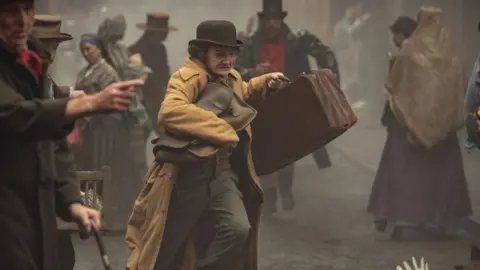 Netflix
NetflixMcCormack and Gleeson say they are proud to be part of a series that puts Ireland on the map, but admit that with pride comes pressure over how it will be received by audiences at home.
“It’s always a factor but I tried not to think about it too much,” Gleeson says. “You want things to be represented well but also hopefully people know not to take it too seriously as a historical document.”
Knight was less worried about what audiences would think, admitting: “I should care but I don’t – if you worry what people are going to think you can’t really do anything as you’d be trying to please too many different people.”
House of Guinness has already been compared to the likes of Succession, The Crown and Peaky Blinders but Knight is indifferent about how people compare it.
“People say every project is a cross between stuff and I don’t take that too seriously, I’m confident that this is its own thing,” he says.
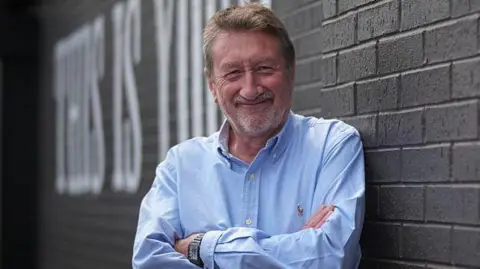 Getty Images
Getty ImagesFor Norton, who is also currently starring in BBC’s historical drama King & Conqueror, to be compared to such successful shows is a positive.
“To be in the same breath as those dynasty shows is great and I’m happy if we’re included among that group,” he says. Gleeson agrees and explains that this drama “takes the best bits of the rest and adds its own magic and essence”.
Knight does admit that there are many similarities between House of Guinness and Peaky Blinders and the shows have influenced each other as the 66-year-old has recently finished working on the Peaky Blinder film, The Immortal Man, which will see Cillian Murphy reprise his role as Birmingham gangster Tommy Shelby.
“Sometimes parallels are pointed out that I don’t even have a clue about,” he laughs. “But there are a lot of similarities – the family, it has the same energy, humour and swagger.”
 BBC Studios
BBC StudiosKnight is also involved in writing the new James Bond film, which he previously told the BBC had always been on his bucket list.
The movie will be directed by Dune’s Denis Villeneuve and is currently in development and being overseen by Amazon MGM Studios after long-serving masterminds Barbara Broccoli and Michael G Wilson stood down in February.
When asked a question about Bond, Knight smiles and says he’s not able to talk about it but does admit that after the success of several of his shows, he feels a greater freedom to write more creatively.
And with House of Guinness, he hopes to have used that freedom to make this latest dynasty saga a success in its own right.
Breaking News
‘Pathetic’ fines won’t stop water pollution, say campaigners
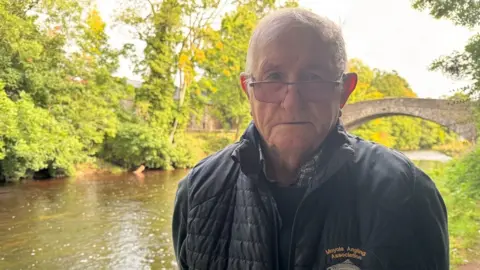
Read more on post.
Luke SprouleBBC News NI Mid Ulster reporter
Campaigners have said stronger deterrents are needed to stop water pollution after figures obtained by BBC News NI showed there were 63 fines handed down between 2020 and 2024.
In the same period there were 4,202 water pollution incidents confirmed by the Northern Ireland Environment Agency (NIEA).
The Department for Agriculture, Environment and Rural Affairs (Daera) is consulting on whether fixed penalty notices should be introduced, which would mean polluters could be fined without the lengthy process of prosecuting them through the courts.
Friends of the Earth said unless there was a more effective deterrent there would be “more and more of these shocking crimes against water”.
In recent years large blooms of potentially toxic blue-green algae in Lough Neagh – caused in large part by long-term pollution – have grabbed the headlines.
But incidents of pollution happen right across Northern Ireland’s waterways, not just those which eventually lead to the lough.
Daera said it and the NIEA took the issue very seriously and that the NIEA investigated all reports it received and pursued offenders.
Call to scrap limit on fines
James Orr from Friends of the Earth said the figures revealed “an epidemic in relation to how we’re treating our rivers, lakes and sea loughs”.
He said fixed penalty notices – which are already used for things such as dog fouling or illegal parking – had pros and cons.
“We can’t have these cases dragged through the courts for years and years and then a pathetic fine introduced at the end.
“On the one hand we would be quite encouraged that we could simplify these processes.
“On the other hand, we need the penalty to reflect the seriousness of the crime.
“This is not like parking on a double yellow line, this is much more serious.”
Under the current rules, the maximum fine that can be handed down is £20,000.
Mr Orr called for this limit to be scrapped and said there should be an independent Environmental Protection Agency.
The Daera consultation on whether to introduce fixed penalty notices is also asking people whether or not the maximum fines should be increased to £50,000 in magistrates’ courts and whether the limit should be removed entirely in Crown courts.
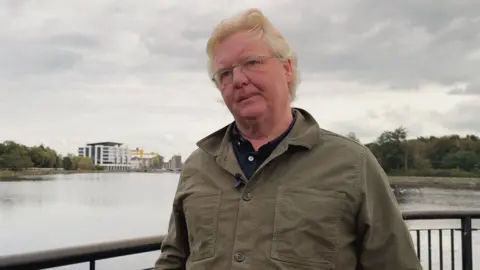
All 63 fines ranged from £200 to £10,000.
Of these, six were more than £5,000.
In a statement, Daera said formal enforcement action was normally considered for water pollution incidents which it deemed to have a “high” or “medium” severity.
Lower severity incidents normally did not lead to formal enforcement action and would see NIEA work with the polluter to identify the cause and stop it happening again.
From 2020 to 2024, 96 incidents were deemed to be high severity and 542 medium, with the rest categorised as low.
People who use the waterways have said they are frustrated that incidents of pollution keep happening.
In June, anglers on the Moyola River raised the alarm after the river was turned brown due to what they believe was discharge from industry.
Maurice Dorrity, who has been fishing on the river for decades, said the situation was getting worse.
“I had a meeting on the bank of the river 30 years ago [to discuss] the same problem and it’s not got any better, it’s still the same,” he said.
“It has a devastating effect on the fish life.
“On the bed of the river the fish depends on the invertebrates, small insects to sustain their life, just like we need the ground to grow our crops.
“It clogs up all that invertebrate life on the bed of the river and it means the fish are not getting the food they require.”
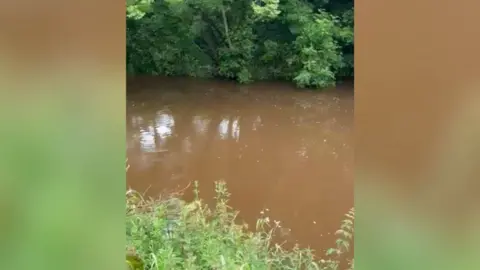
Social Democratic and Labour Party (SDLP) councillor Denies Johnston reported the incident to the NIEA.
She said many of the problems were stemming from some “irresponsible” farmers and industries.
“There must be a two-prong response, we must incentivise good practice and punish infringements,” she said.
“Until we clamp down on those who are disregarding the advice, ignoring regulations and putting their own selfish interests ahead of our environment, our waters will continue to run orange (as was the case in the Moyola in July) and green (as in Lough Neagh).”
A Daera spokesperson said in addition to fines, other methods including warning letters and notices were available to it.
They added that strengthening environmental governance was a top priority for Daera Minister Andrew Muir.
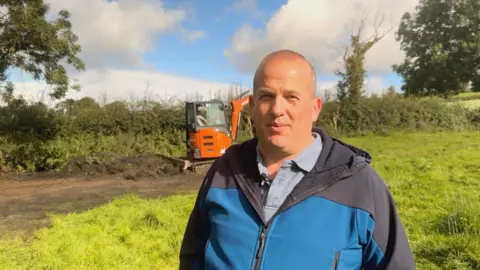
Incidents do not have to be large in scale to cause damage.
Earlier in September, an incident south of Dungannon led to sewage spewing into the River Rhone.
The NIEA said it was caused by wipes and rags being disposed of incorrectly.
Democratic Unionist Party councillor Clement Cuthbertson said it was a reminder that it was not just agriculture to blame for pollution.
“The landowner had livestock in the field and they had to be moved back to allow a clean up to take place,” he said.
“There needs to be investment on the network.
“Our towns and our villages are expanding all the time, but to be fair to NI Water they are still working on the original pipeworks that could be 40 or 50 years old.”
Breaking News
Tánaiste to open new Irish embassy in Washington DC
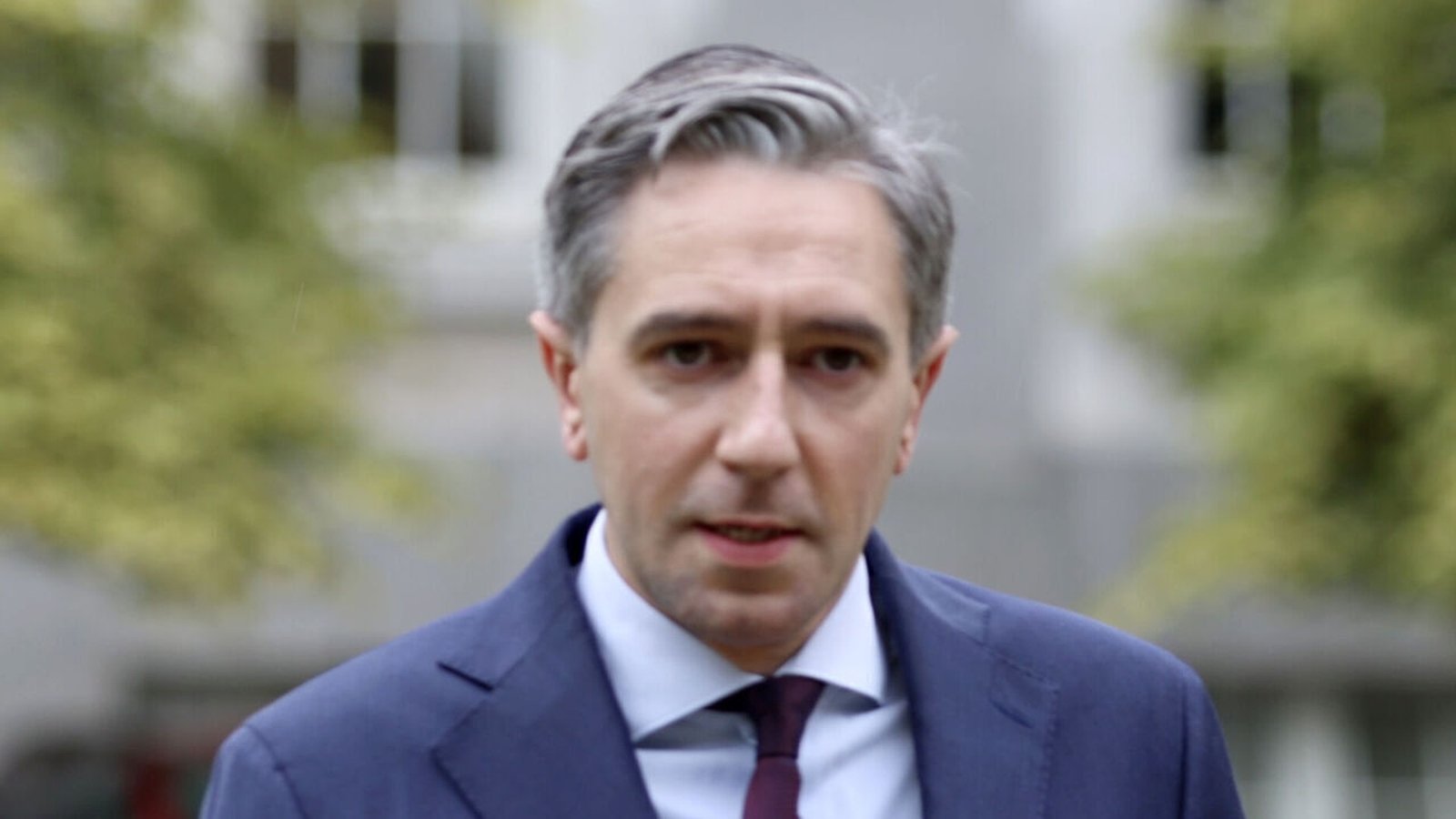
Read more on post.
Tánaiste Simon Harris is due to meet US Commerce Secretary Howard Lutnick as part of a diplomatic trip to the States.
Mr Harris, who is Minister for Foreign Affairs and Trade, travelled to New York to attend the UN High-Level Week.
He is to take part in several meetings in Washington DC today and officially open a new Irish embassy in the US capital.
Mr Harris said there is “no greater sign of the importance of the Irish-US relationship than the opening of Ireland’s new embassy, next to the White House”.
“Our embassy is a testament not just to the shared history between our two countries, but an expression of our aspiration and ambition for a bright future together,” he added.
“It reflects Ireland’s expanding footprint right across the United States, where we now have a network of eight consulates general.
“I look forward to meeting Howard Lutnick and discussing how we can protect and deepen our mutually beneficial economic relationship. Not only is the US investing in Ireland, but Ireland is investing in the US,” he said.
“We are now the fifth largest source of foreign direct investment in America. Across every region of the union, Irish companies have created 200,000 American jobs.
“To that end, I am also delighted today to launch an economic impact report which maps Ireland’s economic footprint across the United States, capturing not only the trade flows between our two countries, but also our research partnerships and tourism figures, and significantly, the remarkable scale of Irish companies who have operations here,” he added.
He said officials would work on a new US strategy to be published in early 2026, coinciding with 250 years since the signing of the Declaration of Independence on 4 July 1776.
Mr Harris said three signatories of that document were born on the island of Ireland.
He last met Mr Lutnick in Washington DC in April on what he said was “a very busy day” for the US administration.
A 90-day pause on higher US tariffs had been announced the previous day, which had threatened a 20% tariff for the EU.
A 15% tariff was later implemented under an EU-US deal, while the previous 10% tariff will apply to goods that are already in transit or have been warehoused for consumption until 5 October.
The “all-inclusive” 15% tariff is on most EU goods, including cars, semiconductors and pharmaceuticals entering the US.
There are “zero for zero” tariffs on a number of products including planes and aircraft parts, some agricultural goods and certain chemicals.
-
Culture2 days ago
Taylor Swift’s new cinema outing generates more than €12million in just 24 hours
-
Politics2 days ago
European Parliament snubs Orbán with vote to shield Italian MEP from Hungarian arrest
-
Culture1 day ago
Milan Fashion Week 2025: Unmissable shows and Giorgio Armani in mind
-
Culture2 days ago
Marvel stars Mark Ruffalo and Pedro Pascal stand up for Jimmy Kimmel as Disney boycott intensifies
-
Opinion2 days ago
AI Is Pointless If It Doesn’t Boost Productivity
-
Business14 hours ago
Households to be offered energy bill changes, but unlikely to lead to savings
-
Culture2 days ago
From Koniaków to Paris: how traditional Polish crocheting is captivating high fashion
-
Culture1 day ago
Traitors Ireland finale: A tense and thrilling conclusion to a spectacular first season




